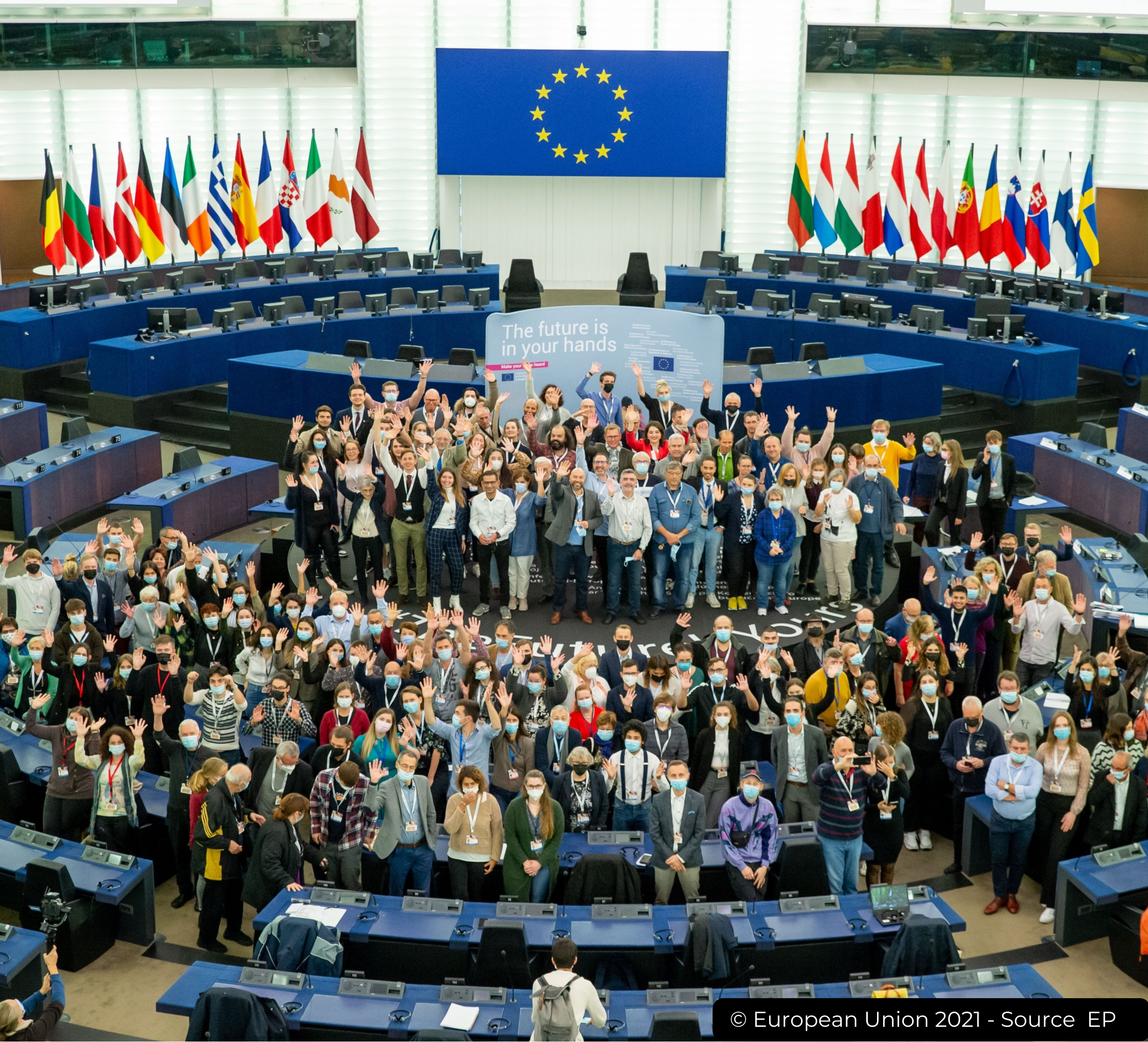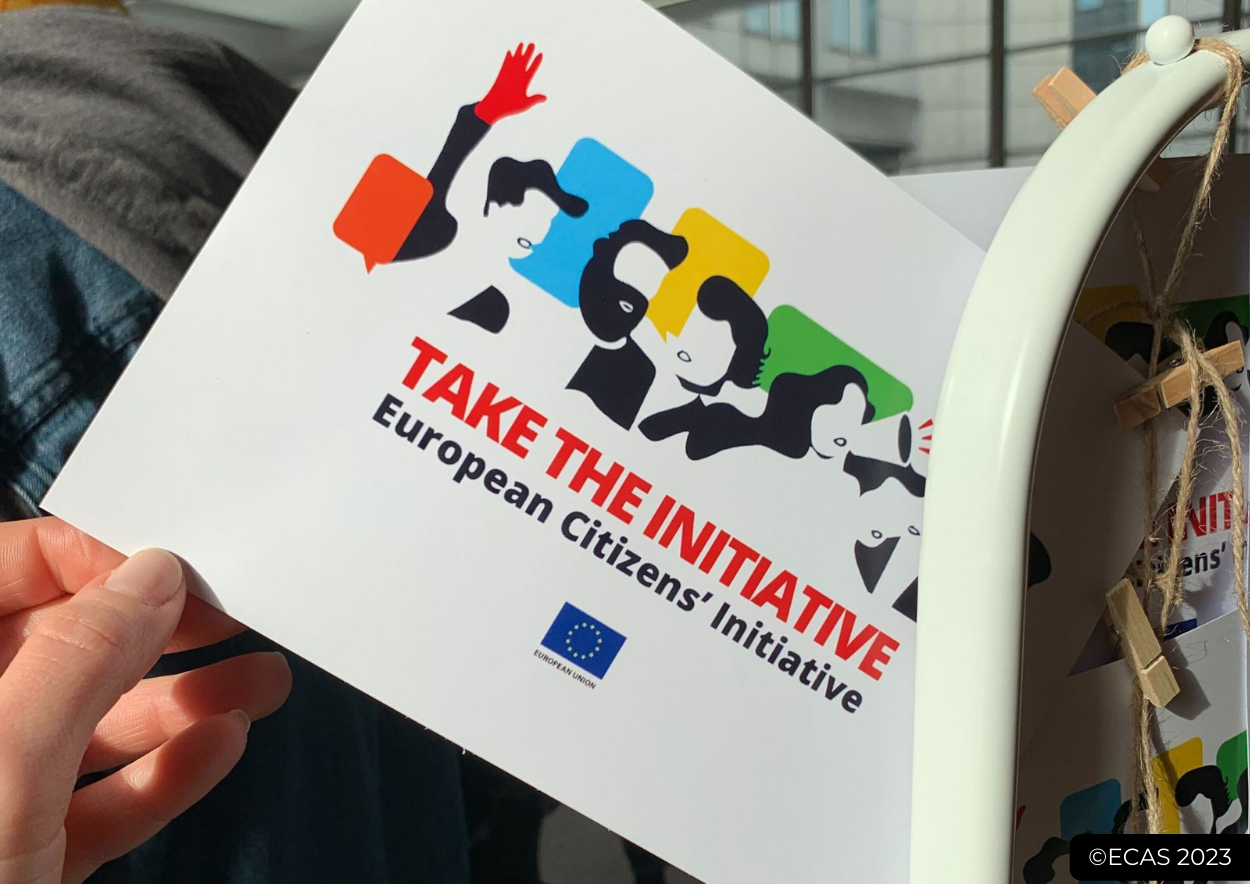Deliberative democracy at the EU level and relations with the CSOs
Content
- Glossary
- What does ‘deliberative democracy mean’?
-
What have been the attempts at citizens’ engagement beyond the European elections before the Conference on the Future of Europe?
-
What was the Conference on the Future of Europe?
-
What were the characteristics of the first post-CoFoE European Citizens’ Panels?
-
How do the European Citizens’ Initiatives work?
-
Example of successful European Citizens’ Initiative
- Recommendations
-
To wrap up
-
Take the quiz!
- Materials and resources
Expected learning outcomes
- To explain what deliberative democracy means.
- To explain the previous attempts at deliberative democracy at the EU level.
- To explain how the CSOs interacted with such processes.
- To illustrate how the European Citizens’ Initiative works.
- To be able to file a European Citizens’ Initiative.
What does ‘deliberative democracy’ mean?
Deliberative democracy claims that political decisions should be the product of fair and reasonable discussion and debate among citizens. Deliberation is seen as a necessary precondition for the legitimacy of democratic political decisions. Consequently, the focus is on the quality of the decision-making process, instead of on the quality of the outcomes.
Deliberative democracy relies on the idea that citizens should arrive at political decisions through the collection of competing arguments. Thus, it rejects the idea that political decisions are just the aggregation of citizens’ preferences —as the idea of representative democracy implicitly affirms.
Deliberative democracy needs, in turn, at least four preconditions to be possible. These four prerequisites are equality, publicity, reasonableness and non-tyranny. Equality refers to the equal possibilities assured to citizens to put issues on the agenda, question, propose solutions and have equal access to political arenas. Publicity requires that all the acts of giving, judging, accepting or rejecting arguments are made public and that they are understandable by all citizens. Reasonableness requires that the arguments are rationally justified and supported (or rejected). Non-tyranny imposes institutional arrangements to prevent unequal power distribution among citizens, thus addressing potential inequality.

What have been the attempts at citizens’ engagement beyond the European elections before the Conference on the Future of Europe?
The main avenue of citizens’ engagement beyond the European elections have been the ‘Citizens’ Dialogues’, based on the concept of ‘town-hall meetings’, where politicians meet with citizens to discuss their concerns or specific political initiatives. The format invited the public to ask questions about EU affairs to European Commissioners and other EU decision-makers, such as MEPs, and national, regional and local politicians. Between their inception, in 2012 and 2019, more than 1.5 thousand Citizens’ Dialogues were organised. Citizens’ Dialogues were criticised for their self-selection bias since they attracted citizens who were already interested in EU matters. Furthermore, according to the 2014 report from the Commission on the Citizens’ Dialogues, they were considered as a ‘communication tool’, rather than a way to establish participatory democracy mechanisms. They mostly followed a question-and-answer format without establishing a structured engagement or a clear follow-up. The conclusions of the Citizens’ Dialogues were summarised in a 20-page report in 2019 as a background document for an informal European Council, but it is unclear what influence the report had on the discussions. Also, cooperation with CSOs on the ground for the organisation of these meetings was limited.
The Commission Von der Leyen 2019-2024 tasked Vice-President Dubravka Šuica with the portfolio of ‘Democracy and Demography’, which included leading the Commission’s work on deliberative democracy and the Conference on the Future of Europe. The DG responsible for it was the Directorate General for Communication (DG COMM), which was already in charge of the Citizens’ Dialogue.
What was the Conference on the Future of Europe?

The Conference on the Future of Europe (CoFoE) was an inter-institutional exercise to promote a common reflection on the future of the EU. Launched by the President of the European Commission, Ursula von der Leyen, and agreed in 2021 in a joint declaration between the Presidents of the European Commission, the European Parliament and the Council of the EU. The Conference aimed to involve different components of EU society, both citizens and policymakers.
Citizens, civil society organisations and stakeholders were encouraged to organise events and publish ideas on the Multilingual Digital Platform (which included a tool to automatically translate into different languages), as well as to support them. The other novelty was the organisation of thematic European Citizens Panels, made of randomly selected European citizens, with criteria to ensure representation of all the Member States and the diversity of European societies, including a mandatory quota of at least one-third of the panels being composed of people under 25 years of age. The ideas from the Citizens’ panels and the Multilingual Platform fed into the proceedings of the Conference Plenary, which prepared the work via thematic working groups.
The CoFoE had a Common Secretariat, composed of the three EU institutions, and an Executive Board, made of an equal number of representatives from the Commission, the Parliament and the Council, which was tasked to prepare the report to the three Presidents of the EU institutions, based on the conclusions of the Plenary. The ambition of representativeness of the CoFoE is well shown by the composition of the Plenary. It was composed of 108 representatives from the European Parliament, 54 from the Council, 3 from the European Commission, 108 from national Parliaments on an equal footing, and 108 citizens: 80 representatives from the European Citizens’ Panels, 27 from national Citizens’ Panels or Conference events (one per Member State), as well as the President of the European Youth Forum. Also, the Plenary included 18 representatives from the Committee of the Regions, 18 representatives from the Economic and Social Committee, 6 elected representatives from regional authorities, 6 elected representatives from local authorities, 12 representatives from the social partners and 8 from civil society. The conference ended in April 2022, and the final report of the Conference was presented in May 2022.
While the goals and the structure of CoFoE were very ambitious, the process had many pitfalls. Civil Society Europe promoted the creation of the Civil Society Convention for the Conference on the Future of Europe, which gathered more than 82 EU networks with hundreds of thousands of citizens’ associations across Europe, to give a unitary voice to CSOs during the CoFoE. The Civil Society Convention worked in parallel to the CoFoE, and produced a report with the civil society proposals, as well as an assessment of the problems the CoFoE faced from a civil society perspective.
The Conference was marked by the understaffing of the Secretariat (which resulted in information and documents arriving at the last minute), by the uncertainty of the scope of the possible proposals (whether they could or not include Treaty changes, of which the Council was sceptical), and by the lack of clarity of the roadmap on how to use the different Plenary meetings and how to summarise the analysis of the proposals from the Multilingual Digital Platform. Altogether, some things were adjusted on the go, but the overall impression was improper preparation for such an ambitious project.

Furthermore, the space allowed for civil society was very little. The inclusion of civil society in the Plenary happened only after a mobilisation of CSOs, and in a number that did not allow all the Working Groups to be properly followed. Differently from social partners, CSOs were not invited as observers to the Executive Board. Social partners and CSOs were the only components that did not receive any funding or travel reimbursement for participation, therefore, participated in the CoFoE at their own expense. In the European Citizens’ Panels, only very few members of CSOs were invited in their individual capacity as experts, while most of them were either academics, or came from the EU institutions, resulting in a lack of diversity and feedback on the impact of EU policies and legislation on the ground. Finally, accessibility for people with disabilities, both to the Multilingual Digital Platform and the Plenary proceedings, was considered lacking.
The follow-up of the Conference was mostly brought by the European Commission. There were 49 proposals, and the Commission indicated that it was working on them in various ways: already implementing laws linked to them; having policy proposals discussed by the Parliament and the Council; working on similar initiatives and using them to refine the policy initiatives; while for others, new initiatives from the Commission would be necessary. The Commission underlined how some of the proposals were beyond the remit of the work of the Commission or would require Treaty changes, a possibility which was not excluded. In a report in 2023, out of the 43 new initiatives announced in the 2023 European Commission work programme, 35 were either directly or indirectly following up on the proposals, with the Commission acting on almost 95% of those Conference measures that were within the Commission’s competence and in accordance with the Treaties. Finally, as part of the follow-up to the Conference, the Commission organised three thematic European Citizens’ Panels, in the fashion of those of the CoFoE, on food waste, on virtual worlds and on learning mobility.
What were the characteristics of the first post-CoFoE European Citizens’ Panels?

Three European Citizens’ Panels about food waste, virtual worlds and learning mobility were organised by DG COMM as a follow-up to the CoFoE. The composition resembled that of those for the CoFoE: EU citizens (around 150 for each panel) were randomly selected to cover all the Member States, ensure gender balance, and represent the variety of European societies (in terms of gender, age, education, urban/rural, and socio-economic background). This included a strong representation of youth, with one-third of the panel composed of people from 16 to 25 years of age. Each panel met three times to prepare the recommendations for the Commission on each topic. The outcomes of the panels were used differently: those of the Panel on food waste were presented to a Commission’s expert group (the EU Platform on Food Losses and Food Waste), those on the virtual worlds became part of the package of the Commission’s communication on Web 4.0, while those on learning mobility were used to draft the Council Recommendation “‘Europe on the Move’ – learning mobility opportunities for everyone”.
The NGO coalition Citizens Takeover Europe, which analysed the panel on food waste, found that the topics were selected top-down by the Commission —without connections to the ongoing public debates on the topics— and that the experts involved, including civil society actors, leaned towards the Commission’s positions on the issue, generating little space for dissenting opinions. The NGO also provided recommendations on how to organise effective, inclusive European Citizens’ Panels. On the other hand, an NGO that was involved in the citizens’ panel on learning mobility and that was interviewed for this entry judged the panel overall positively. The panel happened in parallel with the open public consultation on the new learning mobility framework, aligning it with the stakeholders’ input.
The methodology of the panels’ sessions was developed with and moderated by organisations with expertise in deliberative policy making, while the knowledge committee represented several stakeholders involved in the field. The discussions with the speakers (which included several stakeholders and policy makers) were done in a panel format, and the citizens were required to develop different target groups for learning mobility and finding solutions to their problems towards mobility. The resulting recommendations, and a brief commenting on how they were taken into account, were included in the documents accompanying the publication of the Council Recommendation. Crucially, the interviewed NGO underlined a general alignment between the issues citizens raised and those highlighted in consultations by stakeholders. At the same time, elements of the panel could be improved, such as more variety in the points of view presented during the panels (involving more recognised stakeholders coming from the same constituency and stakeholders representing disadvantaged groups), increasing the transparency of the methodology for the selection of the knowledge committee and the speakers, as well as allowing a broader public to be observers of the panels.
How do the European Citizens’ Initiatives work?
The European Citizens’ Initiative (ECI) is included in the Treaties as a right of European Citizens, according to Art. 11.4 of TEU and Art. 24 of TFEU, and implemented by a specific regulation: at least one million eligible citizens to vote in the European Parliament elections, from at least one-quarter of the Member States (a Member State is counted only if a certain threshold of valid signatures in that country is reached), can invite the Commission to take legislative action, within the competences of the Treaties, on a matter that they deem necessary in order to implement the Treaties.
For an ECI to succeed, there are several steps to be completed: they are explained in detail here. An ECI must be submitted by at least seven EU citizens living in seven different Member States. Once submitted, the Commission will register those initiatives that are within its scope of action, that respect EU values according to Art. 2 of TEU and the rights in the Charter of Fundamental Rights, and that are not considered abusive, frivolous or offensive. Once the ECI is registered and the promoters open it up for signatures, they have 12 months to gather the signatures (either on paper or online). Once the signatures are gathered, they need to be validated by the Member States’ competent authorities. After having received the validation of the signatures, the initiative has to be submitted to the Commission (together with the indication of the sources of funding for the campaign).

After that, the proposers will meet the Commission, and then the Parliament in public session, to present their proposal in detail (with the possibility of Parliament approving a resolution). Within six months from submission, the Commission has to declare whether it will take any actions (of legislative or non-legislative nature), and the reasons why. In the process, every Member State is required to have a minimum of one contact point to offer free information and support to organisers. To help with the different steps, the Commission has established a European Citizens’ Initiative Forum, powered by the NGO ECAS, to get practical information and advice about the European citizens’ initiative, and to discuss any topics related to it.
Due to the great logistical and bureaucratic costs of running an initiative, the success of ECIs can be attributed to the collaboration between individual citizens and the commitment of CSOs. However, the significant disparity between the efforts required for a successful ECI, and the relatively weak legal guarantees of their implementation might deter citizens and CSOs from proposing ECIs, and could even eventually erode citizens’ trust in EU institutions. In fact, as of January 2024, only 10 ECIs have been successful in collecting the required number of signatures and have received an official answer from the Commission, while 59 did not manage to reach the criteria, and 22 were withdrawn.
Example of a successful European Citizens’ Initiative
The first ECI to reach one million signatures was the ‘Right2Water’ initiative. The Commission committed to revising the EU drinking water initiative, including an obligation to EU countries to improve access to water, especially for vulnerable and marginalised groups (Read about seven successful ECIs).
Recommendations
- Involve civil society organisations in the design of the objectives and methodology of future exercises, similar to the Conference on the Future of Europe.
- Ensure that costs of all participants are covered, as well as personal assistance for persons with disabilities to ensure that all are on an equal basis.
- Include civil society from the beginning in the preparation of the future citizens’ panels and/or assemblies.
- Ensure more diversity on the European Citizens’ Panels.
- Clarify the methodology of selection of the knowledge committees and of the speakers for the European Citizens’ Panels.
- Broaden the range of speakers in the panels and in the expert debates, ensure a wider perspective on the topic and possible challenges for implementation on the ground, including the perspective of disadvantaged/discriminated groups, in order to present the participants to the Citizens’ Panels with the pros and cons of ideas.
- Go beyond consultative tools and consider the implementation of binding mechanisms to enhance the impact of citizens’ political participation.
To wrap up
-
Deliberative democracy focuses on the quality of the decision-making process, considered as necessary preconditions for the legitimacy of democratic political decisions, and is based on the preconditions of equality, publicity, reasonableness and non-tyranny.
-
The first experiment of systematically involving citizens beyond the elections were the European Citizens’ Dialogues, which gathered interested citizens in a Q&A with the Commissioners and other policymakers.
-
The Conference on the Future of Europe (CoFoE) was a common process of reflection, held in 2021-2022, on the future of the EU, involving a wide range of policymakers and institutions, a limited representation of stakeholders, and randomly selected citizens via the so-called ‘Citizens’ Panels’.
-
The European Citizens’ Panels were organised after the CoFoE, in the model of those used during the CoFoE, to receive citizens’ input on few Commission’s policy proposals.
-
One million EU citizens, from a quarter of Member States, can ask the Commission to legislate on a topic of EU competence, via the European Citizens’ Initiative (ECI).
-
A successful ECI must have promoters in at least seven Member States and gather one million signatures in at least seven Member States (counted after reaching a threshold) within 12 months from the moment of launching the gathering of signatures.
-
The Commission is not obliged to act on an ECI, but it is obliged to explain why.
Materials and resources
- Citizens Takeover Europe (2023): Statement on the European Citizens’ Panels.
- Council of Europe’s Recommendation CM/Rec(2023)6 of the Committee of Ministers to member States on deliberative democracy.
- European Commission (2023): Follow-up of the Conference on the Future of Europe – one year on.
- Civil Society Europe (2022): Civil Dialogue in the EU – What’s next? Lessons Learnt from the Conference on the Future of Europe and Suggestions to Strengthen Future Civil Dialogue.
- Civil Society Europe (2022): The Future of Europe is Ours: A View from Civil Society. Recommendations from civil society organisations for the Conference on the Future of Europe.
- Conference on the Future of Europe (2022): Report of the final outcome.
-
European Commission (2023): European Citizens’ Panel on Learning Mobility. Final report.
- European Commission (2022): Communication on the Conference on the Future of Europe. Putting Vision into Concrete Action.
- European Commission (2022): 7 Times the European Citizens’ Initiative gave Europeans a real say — with students & young people taking the lead. Medium.
- EU Platform on Food Losses and Food Waste.
- Joint Declaration on the Conference on the Future of Europe (2021).
- OECD (2021): Eight ways to institutionalise deliberative democracy.
Project information
Project Type: Collaborative Project
Call: H2020 SC6 GOVERNANCE-01-2019: Trust in Governance
Start: February 2020
Duration: 48 Months
Coordinator: Prof. Dr. Christian Lahusen,
University of Siegen
Grant Agreement No: 870572
EU-funded Project Budget: € 2,978,151.25


